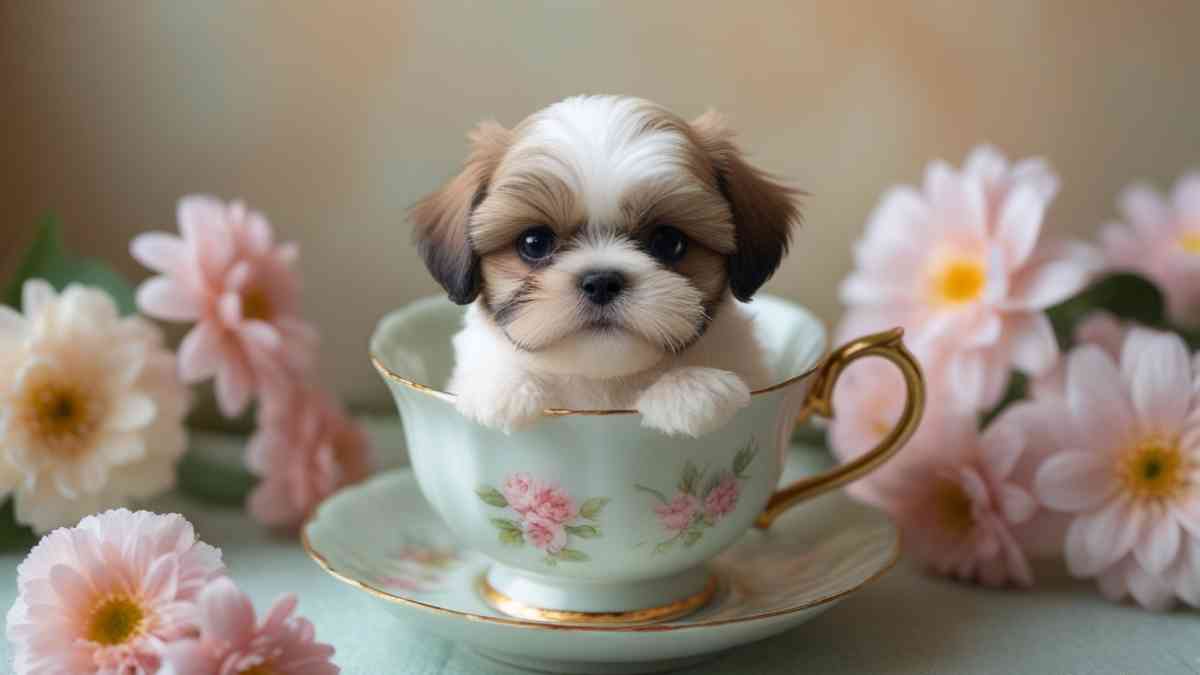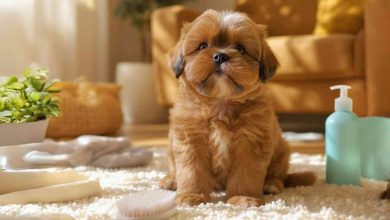Teacup Shih Tzu Puppies: Are They Real or Just a Marketing Trick?

The Shih Tzu, with its rich history tracing back to ancient China, has always been celebrated for its charming demeanor, luscious coat, and loyal companionship. In recent years, a trend emerged that further sparked interest: the Teacup Shih Tzu. Their tiny, doll-like appearance has captivated the hearts of dog lovers worldwide. But as enchanting as they look, a pressing question remains: Are Teacup Shih Tzu puppies truly a breed, or just a clever marketing term?
Understanding the reality behind these miniature marvels is essential, not only to protect future pet owners from unethical practices but also to prioritize the welfare of these adorable canines.
What Is a Teacup Shih Tzu?
The term “Teacup Shih Tzu” is not recognized by official canine organizations like the American Kennel Club (AKC) or The Kennel Club in the UK. In simple terms, it refers to a Shih Tzu that is much smaller than the breed standard, often weighing under 7 pounds (3.2 kilograms) at maturity.
Rather than being a distinct or official breed, the “teacup” title is a marketing label used to attract buyers looking for exceptionally small dogs. These dogs are either the smallest puppies from a litter (runts) or the result of selective breeding that emphasizes smaller and smaller sizes.
The Truth About Teacup Shih Tzus
The truth is straightforward: Teacup Shih Tzus do exist physically, but not because there is a specific “teacup” bloodline. Their tiny size often stems from genetic manipulation, breeding undersized parents, or, in some unfortunate cases, unethical practices such as stunted growth due to malnutrition.
It’s important to understand that no legitimate kennel club recognizes a “Teacup Shih Tzu” as an official breed. Instead, responsible breeders aim to maintain healthy size standards for the Shih Tzu breed — generally around 9 to 16 pounds.
Why the Teacup Phenomenon Gained Popularity
Marketing undoubtedly plays a big role. The word “teacup” evokes images of puppies small enough to fit inside a teacup, instantly triggering emotional responses. For urban dwellers, busy professionals, and those looking for “designer pets,” a teacup-sized Shih Tzu sounds ideal: portable, cute, manageable, and unique.
Unfortunately, this fascination sometimes leads to overlooking the health risks associated with breeding dogs to such tiny proportions.
Health Concerns in Teacup Shih Tzus
Teacup Shih Tzus, while undeniably adorable, often come with a long list of potential health issues. Because they are bred primarily for size rather than for robust genetics, they are vulnerable to several serious conditions:
-
Hypoglycemia: Tiny puppies can suffer from dangerously low blood sugar levels, leading to seizures or even death without immediate treatment.
-
Bone Fragility: Their delicate bones are prone to fractures even from minor falls or rough handling.
-
Brachycephalic Syndrome: Shih Tzus already have short snouts. In teacup-sized dogs, respiratory problems can become even more severe.
-
Dental Issues: Their tiny mouths often result in overcrowded teeth, raising the risk of painful infections and periodontal disease.
-
Liver Shunts: A serious and life-threatening condition where the liver is bypassed by the circulatory system, allowing toxins to build up.
-
Shorter Lifespan: Due to compounded health issues, teacup Shih Tzus often have a reduced life expectancy compared to their standard-sized counterparts.
These risks underline why prospective owners must think beyond just appearance when choosing a pet.
Caring for a Teacup Shih Tzu
Despite their health vulnerabilities, Teacup Shih Tzus often have the same loving, affectionate personalities as regular-sized Shih Tzus. They are gentle, loyal, and thrive on human interaction.
However, caring for them demands extra vigilance:
-
Gentle Handling: Due to their fragility, households with small children may not be ideal unless children are taught to be very careful.
-
Constant Supervision: Even small falls from a couch or a minor accident can cause significant injury.
-
Special Nutrition: Small dogs need properly balanced diets to maintain healthy blood sugar levels.
-
Frequent Veterinary Visits: Regular health check-ups are crucial to monitor for hidden or emerging health issues.
-
Dedicated Grooming: Like all Shih Tzus, their coats require regular brushing, bathing, and maintenance to stay healthy and tangle-free.
Proper care can make a world of difference in their overall health and quality of life.
Ethical Concerns About Breeding Teacup Dogs
Breeding Teacup Shih Tzus raises serious ethical questions. When breeders intentionally prioritize size over health, it often leads to exploitation and suffering for the animals involved. Common unethical practices include:
-
Breeding runts over and over
-
Deliberate underfeeding to stunt growth
-
Inbreeding to preserve small size genes, leading to genetic defects
Reputable breeders never advertise “teacup” sizes, and they focus instead on breeding healthy, happy, well-tempered dogs. It’s crucial for potential pet owners to avoid puppy mills and unscrupulous breeders who put profits over puppy welfare.
The Benefits of Owning a Small Shih Tzu
If ethically bred and healthy, small Shih Tzus can offer a variety of benefits:
-
Apartment-Friendly: Their small size makes them perfect for limited spaces.
-
Companionship: Shih Tzus are naturally affectionate and love to be close to their owners.
-
Low Exercise Requirements: Unlike larger breeds, they do not require intense physical activity.
-
Manageable Grooming: Though grooming is necessary, their manageable size makes bath times and maintenance easier.
It’s important, however, to ensure that the small size comes naturally, not at the expense of the dog’s health.
Warning Signs When Buying a Teacup Shih Tzu
Before buying or adopting a tiny Shih Tzu, watch for red flags:
-
No Health Guarantees: A reputable breeder provides full health certifications and warranties.
-
Breeder Promises Extremely Tiny Sizes: If a breeder advertises puppies that will stay under 5 pounds, be cautious.
-
No Transparency: Unwillingness to show the puppy’s parents or facility is a major warning.
-
Price Markup for Size: Teacup Shih Tzus often come with sky-high prices justified solely based on their size — another indicator of marketing trickery.
Always do your research and never hesitate to ask hard questions before making a commitment.
Better Alternatives to a Teacup Shih Tzu
If your heart is set on a small companion, there are healthier alternatives:
-
Adopt a Standard Shih Tzu: Many full-grown Shih Tzus naturally stay on the smaller side without compromising their health.
-
Choose Reputable Breeders: Focus on breeders who prioritize temperament, health, and conformation to breed standards.
-
Other Small Breeds: Consider naturally small and sturdy breeds like the Yorkshire Terrier, Maltese, or Toy Poodle.
Conclusion
Teacup Shih Tzu puppies are real in appearance but not in breed legitimacy. They are often the result of selective or unethical breeding practices that emphasize size over well-being. While their tiny frames and wide-eyed charm can be irresistible, it’s vital to understand the ethical, health, and financial implications before bringing one home.
Prioritizing the health and happiness of a dog should always come before trends or marketing buzzwords. A well-cared-for standard Shih Tzu can bring just as much joy, love, and companionship — and often with fewer health concerns.
Before you fall for the teacup trend, take a step back and ask:
Am I choosing a dog for its size, or for the life we can share together?




